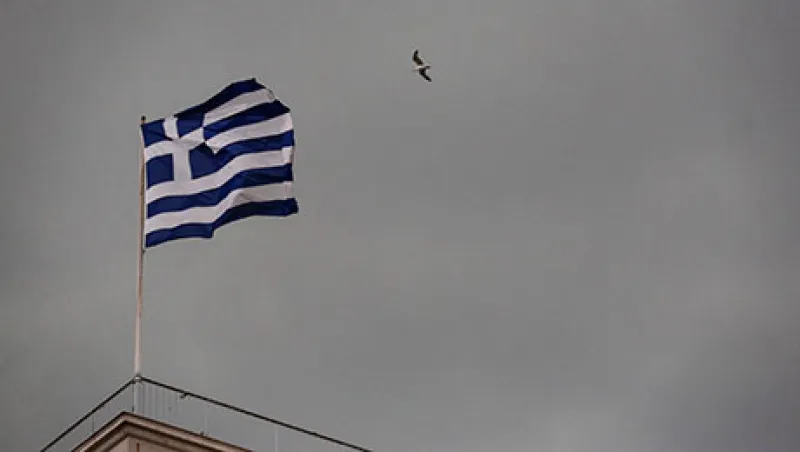The specter of a Grexit from the euro is back. If it comes, euro zone bond and equity markets are not likely to be struck by panic but will instead “ride out the storm,” says Tom Elliott, international investment strategist at financial advisory organization deVere Group in London.
“I think the weakness, if any, will be on peripheral European stock markets in Italy, Portugal, Spain, Ireland — the ones that were in trouble before,” Elliott says. “I don’t think we need to worry too much about damaging the German DAX and the French CAC.”
Any potential shock to euro zone equities would be muted by the same force that led investors to crowd into such funds in the first place, says Elliott. And that would be the January 22 commitment by European Central Bank president Mario Draghi to a €1 trillion ($1.1 trillion) quantitative easing program. Monthly public and private sector securities purchases of €60 billion will continue at least through the end of September 2016 — or until euro zone inflation moves toward the ECB’s 2 percent target rate.
Despite fears of a Greek default and exit hanging over the European Economic and Monetary Union, institutional investors were responsible for net inflows of $10.9 billion into euro zone equity funds over the first quarter of 2015, according to eVestment, a Marietta, Georgia–based financial data firm. That brought total euro zone equity fund assets to $38.7 billion. A single exchange-traded fund, the exporter-heavy WisdomTree Europe Hedged Equity Fund (HEDJ), accounts for $10.6 billion — or nearly all the fund flows into the euro zone in the first quarter, according to eVestment. The ETF’s 18.2 percent return placed it No. 1 among the 96 euro zone equity funds that eVestment tracks. Its three-year 18.55 percent return also places it at the top of its class.
“We think European exporters can have a catalyst to grow their earnings across their products if the euro depreciates further,” says Christopher Gannatti, associate director of research at WisdomTree in New York, which both designs indexes and creates investment products built on those indexes. His positive view is buoyed by the U.S. economy’s continued relative economic strength compared with Europe and market expectations that the Federal Reserve will hike its federal funds rate by the end of the year, with the potential to push the U.S. dollar higher and make European exports more competitive.
The allure of a currency-hedged European ETF follows a familiar pattern, according to Patricia Oey, senior analyst and manager of research for all funds at Morningstar in Chicago. Investors watched as currency-hedged Japanese ETFs took off in 2013 and 2014 in response to quantitative easing by the Bank of Japan. As the ECB announced its similar move early this year, investors jumped into currency-hedged euro zone ETFs, expecting a similar outcome. And, says Oey, “it’s been a good call.”
Since the start of 2015, HEDJ has been getting a run for its money from two newer, rival euro zone equity ETFs, according to Oey. BlackRock’s iShares Currency Hedged MSCI Eurozone ETF (HEZU) has topped HEDJ’s 16.3 percent return year-to-date as of June 29, with 17.3 percent over that same period, according to Morningstar. And the Deutsche X-trackers MSCI EMU Hedged Equity ETF (DBEZ) has returned 18.4 percent year-to-date as of June 29. The BlackRock and Deutsche ETFs are market-cap-weighted indexes.
There are signs the euro zone equity rally is losing a bit of steam, though. HEDJ’s monthly net inflows peaked this year at $5.03 billion in March, slowed to $2.6 billion in April, $617 million in May and $578.4 million for the first 29 days of June. Elliott points to a swoon on the DAX that began in April as a sign of the sagging outlook. Worries about liquidity in the German Bund market spilled over into equities, prompting profit-taking by investors who had seen a big run-up in German stocks, according to Elliott. The DAX rose 26 percent by April 10 before a correction pushed it to a year-to-date gain of 11.7 percent by June 17.
Is it too late to get into euro zone equities? No, says Todd Rosenbluth, senior director and director of ETF and mutual fund research for the U.S. at S&P Capital IQ in New York, because the weak euro will persist as long as the ECB pursues its quantitative easing program. “This should give a tailwind for the European economy and thus to companies in European funds,” he says. He expects the European economy to gradually improve — but not enough to lead the ECB to wind down quantitative easing in the immediate future. There is, however, says Elliott, a chance that the ECB might wind down its bond-buying program before September 2016, if there are more signs of economic improvement.
In the case of a Greek default, expect volatility in bonds and equities in Italy, Spain, Portugal and Ireland as investors worry which country might be next. With volatility will come tempting “standout opportunities,” Elliott predicts. Step in cautiously, he urges, and avoid a portfolio overweight in euro zone equities.






